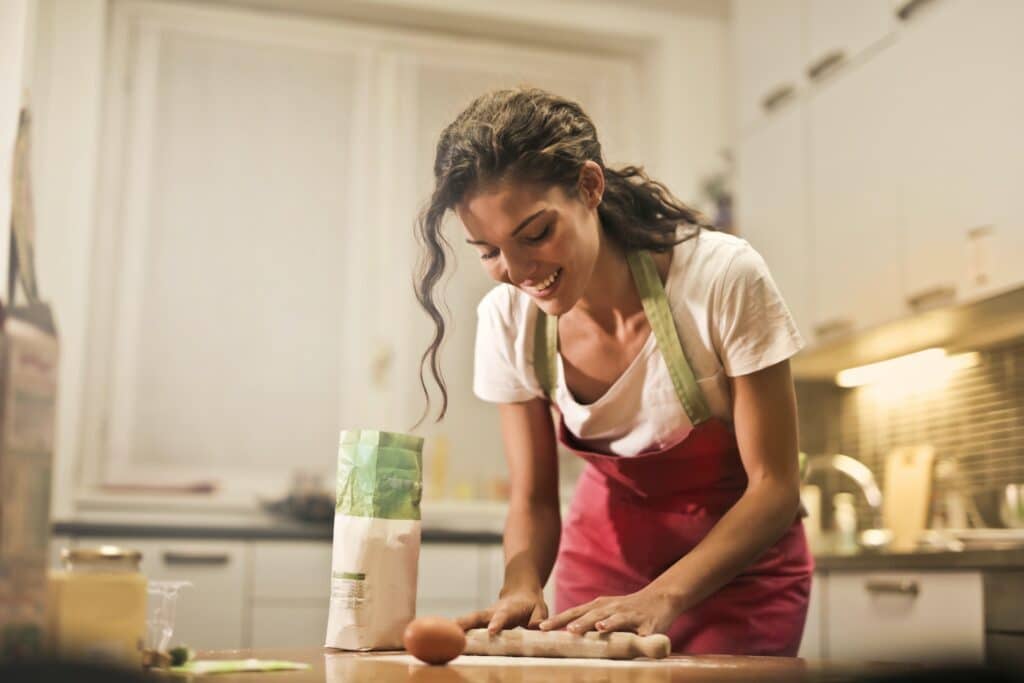Cooking is an art and to make art, you need to hire an artist. Well, not literally. In this case, a cook who will be proficient in culinary and hygienic skills.
In this guide, we delve into the essential aspects of hiring a cook who not only possesses the right skill set but also aligns with the culinary vision of your establishment. We’ll explore how to effectively evaluate a cook’s abilities through various testing methods, where to source prospective candidates, and what to include in a compelling cook job description. Furthermore, we’ll touch upon the cost considerations and offer a comprehensive set of interview questions tailored to unearth the finest culinary talents. Join us in this culinary journey as we unravel the strategies to assemble a remarkable team, preventing mis-hires through insightful cooking skill assessments.
What is the role of a cook?
At the heart of every successful culinary endeavor stands the indispensable figure of a cook. A cook isn’t merely a master of recipes; they’re the architects of taste, the creators of gastronomic artistry that leaves an indelible mark on patrons. Their role extends far beyond the confines of the kitchen, as their culinary prowess significantly influences a company’s growth trajectory. A cook’s dedication, precision, and innovation can transform a dining experience into an unforgettable journey, attracting a loyal customer base and setting a high bar for excellence.
Roles and responsibilities:
As a cook, your responsibilities encompass a wide array of tasks that collectively contribute to the seamless functioning and advancement of the establishment. Key duties include:
Menu Execution: Craft and execute diverse dishes according to set recipes, ensuring consistent quality and taste.
Ingredient Management: Source, prepare, and store ingredients in adherence to safety and freshness standards.
Technique Mastery: Demonstrate expertise in cooking techniques, from sautéing to roasting, to elevate dishes to perfection.
Collaborative Coordination: Work harmoniously within the kitchen team, orchestrating the preparation and timely service of dishes.
Innovation and Adaptability: Introduce creative variations to existing dishes and adapt recipes based on ingredient availability and customer preferences.
Quality Control: Maintain rigorous quality control to ensure dishes meet or exceed the establishment’s standards.
Hygiene and Safety: Adhere to strict sanitation practices, ensuring a safe and clean kitchen environment.
A cook’s proficiency spans beyond culinary finesse; it weaves together teamwork, precision, and creativity to elevate a company’s culinary offerings. Their dedication to enhancing dining experiences fuels the growth of the establishment, creating a reputation that draws in eager patrons seeking unforgettable flavors.
Hard skills to assess in a cook
When evaluating potential candidates for the role of a cook, specific hard skills play a crucial role in determining their suitability for the position. These technical proficiencies form the backbone of culinary excellence, ensuring that the dishes prepared are not just palatable but extraordinary. Here’s what to look for and how to assess these essential hard skills:
Culinary Techniques Mastery: A skilled cook should exhibit a solid foundation in fundamental culinary techniques. Assess their proficiency in techniques such as knife skills, searing, grilling, baking, and more. Request them to demonstrate these skills through a practical cooking task, highlighting their precision, speed, and finesse.
Ingredient Knowledge: The ability to identify, select, and work with various ingredients is paramount. Gauge their familiarity with different ingredients, their flavors, and suitable pairings. You can inquire about their experience with diverse cuisines and ask them to suggest ingredient substitutions for specific dishes.
Time Management: Cooking is a dance against the clock, particularly in a bustling kitchen. Inquire about their approach to managing multiple tasks simultaneously while maintaining the quality of their output. A practical test, where they’re required to prepare multiple dishes within a stipulated time, can provide valuable insights.
Menu Adaptation: A cook’s adaptability is evident in their capacity to modify dishes based on dietary restrictions, ingredient availability, and customer preferences. Present them with a hypothetical scenario where they need to alter a recipe to accommodate specific dietary needs.
Plating Aesthetics: The visual appeal of a dish is often as crucial as its taste. Evaluate their creativity in plating by requesting them to present a dish in an appealing and artistic manner. Aesthetically pleasing presentation reflects attention to detail and a commitment to culinary artistry.
Food Safety and Hygiene: Compliance with strict food safety and hygiene standards is non-negotiable. Inquire about their knowledge of proper food handling, storage, and sanitation practices. Their responses should demonstrate a thorough understanding of maintaining a clean and safe kitchen environment.
Equipment Proficiency: A competent cook should be adept at utilizing various kitchen equipment, from stovetops to ovens and beyond. Discuss their experience with different kitchen tools and appliances, and consider including a practical task involving equipment operation.
By meticulously assessing these hard skills, you can ensure that the candidates you select possess the technical acumen required to excel in the demanding role of a cook. These proficiencies collectively contribute to delivering exceptional culinary experiences that resonate with patrons and drive the growth of your establishment.

Soft skills to assess in a cook
While technical expertise is pivotal, a cook’s success also hinges on a set of invaluable soft skills that foster teamwork, adaptability, and an enriching culinary experience. When evaluating candidates for the role of a cook, consider these essential qualities that contribute to a harmonious kitchen environment and exceptional customer satisfaction:
Team Collaboration: In a bustling kitchen, seamless teamwork is paramount. Observe how well candidates communicate and coordinate with colleagues during a practical task or a role-playing scenario. A willingness to share responsibilities, offer assistance, and maintain composure under pressure showcases strong teamwork.
Adaptability and Creativity: The culinary landscape is ever-evolving, requiring cooks to adapt to new trends, ingredients, and challenges. Inquire about their experiences in handling unexpected situations, menu changes, or improvisations. An innovative approach to modifying recipes and suggesting creative solutions reflects adaptability and creativity.
Stress Management: Kitchens can be high-pressure environments, demanding resilience and composure. During the interview, discuss how candidates handle stress, maintain focus, and ensure quality amid time-sensitive tasks. Their ability to keep a level head positively impacts both kitchen dynamics and diner satisfaction.
Attention to Detail: From seasoning to plating, the finer details greatly influence the end result. Request examples that showcase their meticulousness in tasks like food presentation, portion control, and quality assessment. A keen eye for detail is indicative of a commitment to excellence.
Customer Focus: Understanding and exceeding customer expectations is central to culinary success. Ask candidates about instances when they’ve gone the extra mile to ensure diner satisfaction. Their passion for delivering outstanding dining experiences underscores a customer-centric approach.
Communication Skills: Effective communication is vital, whether it’s conveying instructions to colleagues or addressing customer inquiries. Evaluate their clarity, listening skills, and ability to articulate ideas. A cook’s capacity to convey information accurately minimizes errors and misunderstandings.
Time Management: In a fast-paced environment, juggling tasks efficiently is essential. Inquire about their methods for prioritizing tasks and meeting deadlines. A well-structured approach to time management ensures timely delivery of dishes without compromising quality.
Leadership Potential: For more senior roles, assess their potential to lead and mentor junior staff. Ask about instances where they’ve guided a team or shared their expertise. Strong leadership qualities contribute to a well-functioning kitchen hierarchy.
Evaluating these soft skills enables you to identify candidates who possess the interpersonal finesse needed to enhance teamwork, elevate dining experiences, and contribute to the growth of your culinary establishment.
How to test a cook’s skills
Evaluating a cook’s skills requires a strategic approach that goes beyond traditional interviews. Employing hands-on tests allows you to witness their culinary prowess in action and make informed hiring decisions. Here are effective ways to assess a cook’s capabilities:
Cooking Challenge: Provide candidates with a specific dish to prepare within a set timeframe. This test gauges their technical proficiency, time management, and ability to follow instructions accurately. It showcases their adaptability and creativity while maintaining quality standards.
Knife Skills Assessment: A cook’s knife skills are indicative of their precision and efficiency in the kitchen. Request them to perform tasks like chopping, dicing, and julienning various ingredients. Their knife handling technique and speed offer insights into their level of expertise.
Blind Taste Test: Present candidates with a selection of ingredients and ask them to identify each item by taste or aroma alone. This test evaluates their ingredient knowledge, palate accuracy, and sensory acuity.
Menu Adaptation Exercise: Challenge candidates to modify a recipe based on hypothetical scenarios, such as ingredient unavailability or dietary restrictions. This exercise showcases their flexibility, problem-solving skills, and creativity in adjusting dishes.
Plating Presentation: Provide a basic dish and observe how candidates elevate its presentation. Plating aesthetics demonstrate attention to detail, artistic flair, and their commitment to delivering visually appealing dining experiences.
These technical tests are essential as they:
Unveil Practical Skills: Practical assessments reveal a candidate’s real-time culinary proficiency, helping you gauge their competence more accurately than theoretical discussions alone.
Showcase Adaptability: Cooking challenges and menu adaptations reflect a cook’s ability to handle unexpected situations and tailor their skills to varying circumstances.
Reflect Precision: Knife skills and blind taste tests showcase precision, a crucial aspect of culinary excellence, and highlight their finesse in various techniques.
Highlight Creativity: These tests provide glimpses into a candidate’s creative flair, which is essential for innovating recipes and enhancing the dining experience.
By incorporating these technical tests, you gain a comprehensive understanding of a cook’s capabilities, ensuring that their skills align with the demands of your culinary establishment, and contributing to the growth and success of your venture.

Where to find the best cooks
Discovering the finest culinary talents to join your team requires a strategic approach that leverages diverse platforms. Here’s how to tap into the right channels to attract the most suitable candidates for the cook position:
Online Job Portals: Utilize popular job portals like Indeed, LinkedIn, and Culinary Agents to post detailed job descriptions. Highlight the unique aspects of your establishment, the culinary vision, and the growth opportunities you offer. These platforms allow you to reach a vast pool of potential candidates actively seeking new opportunities.
Culinary Schools and Institutes: Forge partnerships with local culinary schools and institutes. Attend job fairs, workshops, or networking events to connect with aspiring cooks who are eager to kickstart their culinary careers. These venues offer access to fresh talent eager to make their mark.
Professional Associations and Forums: Engage with culinary associations and online forums that cater to cooking professionals. Participate in discussions, share insights about your establishment, and provide a platform for potential candidates to learn about your work culture and opportunities.
Social Media Platforms: Leverage the power of social media to showcase your culinary offerings. Share vibrant images, videos, and testimonials that highlight your team’s expertise and the dining experiences you create. Platforms like Instagram and Facebook can attract candidates who resonate with your establishment’s culinary ethos.
Referrals and Word of Mouth: Tap into your network within the culinary industry. Encourage current employees, industry peers, and acquaintances to refer potential candidates. Word of mouth can lead to high-quality recommendations from trusted sources.
Local Culinary Events: Attend and participate in local food festivals, chef competitions, and culinary events. These gatherings provide an excellent opportunity to connect with passionate cooks who share your enthusiasm for gastronomy.
By strategically utilizing these platforms, you can cast a wide net and attract the best-suited candidates for the cook position. Tailor your approach to each platform’s strengths, whether it’s the expansive reach of online job portals or the targeted engagement of culinary schools and associations. This ensures that your culinary establishment welcomes skilled cooks who are aligned with your vision and poised to contribute to its growth.
Cook job description template
Have a look at this job description template to hire a cook.
About Us: [Company Name] is a renowned culinary establishment committed to delivering exceptional dining experiences. With a focus on creativity, quality, and innovation, we take pride in our diverse menu offerings that tantalize taste buds and captivate our patrons’ senses.
Responsibilities:
- Prepare and execute a variety of dishes according to established recipes, ensuring consistent taste and presentation.
- Collaborate with kitchen team members to ensure smooth service, maintaining impeccable timing and quality standards.
- Demonstrate mastery in culinary techniques, from knife skills to cooking methods, enhancing the quality of dishes.
- Adapt recipes to accommodate dietary restrictions, ingredient availability, and customer preferences.
- Ensure compliance with food safety, hygiene standards, and kitchen cleanliness.
Qualifications:
- Proven experience as a cook in a similar establishment.
- Proficiency in culinary techniques, with knowledge of various cuisines and ingredients.
- Strong organizational and multitasking skills, adept at handling high-pressure environments.
- Excellent communication skills to collaborate effectively with colleagues and take direction.
- Relevant culinary certifications are a plus.
Why Join Us?
- Be part of a dynamic culinary team dedicated to delivering culinary excellence.
- Opportunities for professional growth and skill development.
- Experience a creative and innovative work environment that encourages culinary exploration.
- Contribute to an establishment known for its outstanding culinary offerings and customer satisfaction.
Benefits:
- Competitive salary and performance-based incentives.
- Comprehensive health and wellness benefits package.
- Employee discounts on dining experiences.
- Ongoing training and development opportunities.
Application Process: Interested candidates are invited to submit their resume, along with a cover letter detailing their culinary experience and passion for gastronomy. Shortlisted candidates will be contacted for an interview.
Other Important Information:
- Location: [City, State]
- Full-time position
At [Company Name], we believe that every dish we create tells a story, and we invite passionate and skilled cooks to join us in crafting these narratives that resonate with our patrons. If you’re ready to elevate your culinary journey and be part of an extraordinary team, we welcome your application.
Please send your application to [Email Address]. We look forward to discovering your culinary talents!
How much does a cook cost?
In the US market, the cost of hiring a cook can vary based on experience and skill level. According to recent data:
- Entry-Level Cook: Average annual salary ranges from $25,000 to $30,000.
- Mid-Level Cook (2-5 years experience): Average annual salary is around $30,000 to $40,000.
- Experienced Cook (5+ years experience): Average annual salary can range from $40,000 to $50,000.
- Specialized Skills (e.g., Sous Chef, Head Cook): Annual salaries may exceed $50,000, depending on the level of expertise and responsibilities.
These figures are approximate and can be influenced by factors such as location, type of establishment, and specific culinary skills possessed by the cook.
Cook interview questions
Conducting a thorough interview is crucial to finding the right cook who aligns with your culinary vision. To ensure a comprehensive assessment, categorize questions into soft skills, hard skills, and general skills:
Importance of Interview Questions: Interview questions help uncover a candidate’s culinary proficiency, teamwork, and adaptability. Evaluating soft skills, hard skills, and general attributes ensures a holistic understanding of their potential contribution to your establishment.
Soft Skills:
1. Can you describe a situation where you had to collaborate with your kitchen team to overcome a challenging service?
2. How do you handle unexpected changes to the menu, such as ingredient shortages or last-minute substitutions?
Hard Skills:
3. Walk us through your experience with various cooking techniques, such as sautéing, grilling, and baking.
4. Can you share an example of a dish you’ve adapted to accommodate dietary restrictions without compromising taste or presentation?
5. What is your approach to maintaining food safety and hygiene standards in a busy kitchen environment?
General Skills:
6. How do you manage your time efficiently during a busy service to ensure all orders are prepared and delivered on time?
7. Can you demonstrate your knife skills by performing tasks like chopping, dicing, and mincing?
8. Describe a time when you received feedback on a dish. How did you handle constructive criticism?
Soft Skills:
9. Tell us about a time when you demonstrated adaptability in a fast-paced kitchen. How did it impact the overall service?
10. How do you ensure effective communication with your colleagues during a busy service to avoid errors and delays?
Hard Skills:
11. Can you suggest creative variations to a classic dish to give it a unique twist?
12. Incorporating a specific ingredient we use, how would you modify a dish to cater to vegetarian diners?
General Skills:
13. What do you believe sets apart an exceptional dining experience beyond just the taste of the food?
14. Share a situation where you had to handle a stressful moment during service. How did you maintain your composure?
15. Why do you believe your culinary expertise would be a valuable addition to our kitchen team?
By asking these targeted interview questions, you can effectively evaluate a candidate’s technical prowess, adaptability, teamwork, and overall fit for your culinary establishment. This holistic approach ensures that the cook you hire not only excels in the kitchen but also contributes to the growth and excellence of your dining experience.
Assess for cook to avoid mis-hires
In the fast-paced world of culinary arts, hiring the right cook is not just about filling a vacancy, but securing a skilled artisan who can elevate your establishment. Integrating comprehensive cook assessment into your hiring process can significantly reduce the risk of mis-hires and streamline your recruitment efforts.
Streamlining Hiring Time: Assessments offer an efficient way to evaluate a candidate’s culinary capabilities, soft skills, and technical expertise. This saves valuable time by providing concrete insights upfront, allowing you to focus on candidates who align with your requirements.
Enhanced Skill Evaluation: Assessments provide a practical glimpse into a candidate’s abilities, going beyond what resumes and interviews can reveal. Practical tests, like cooking challenges and ingredient identification, offer a firsthand understanding of their expertise.
Making Informed Decisions: By assessing candidates’ cooking skills, adaptability, and teamwork, you make more informed decisions. This ensures that the cook you hire not only possesses the necessary hard and soft skills but also contributes positively to your kitchen’s dynamics and overall growth.
Ready to take your cook hiring process to the next level? Consider Testlify, the advanced talent assessment tool tailored to culinary recruitment. Our platform offers a range of assessments that thoroughly evaluate candidates’ culinary proficiencies. Schedule a free 30-minute live demo today to see how Testlify can help you assemble a talented and harmonious kitchen team.








